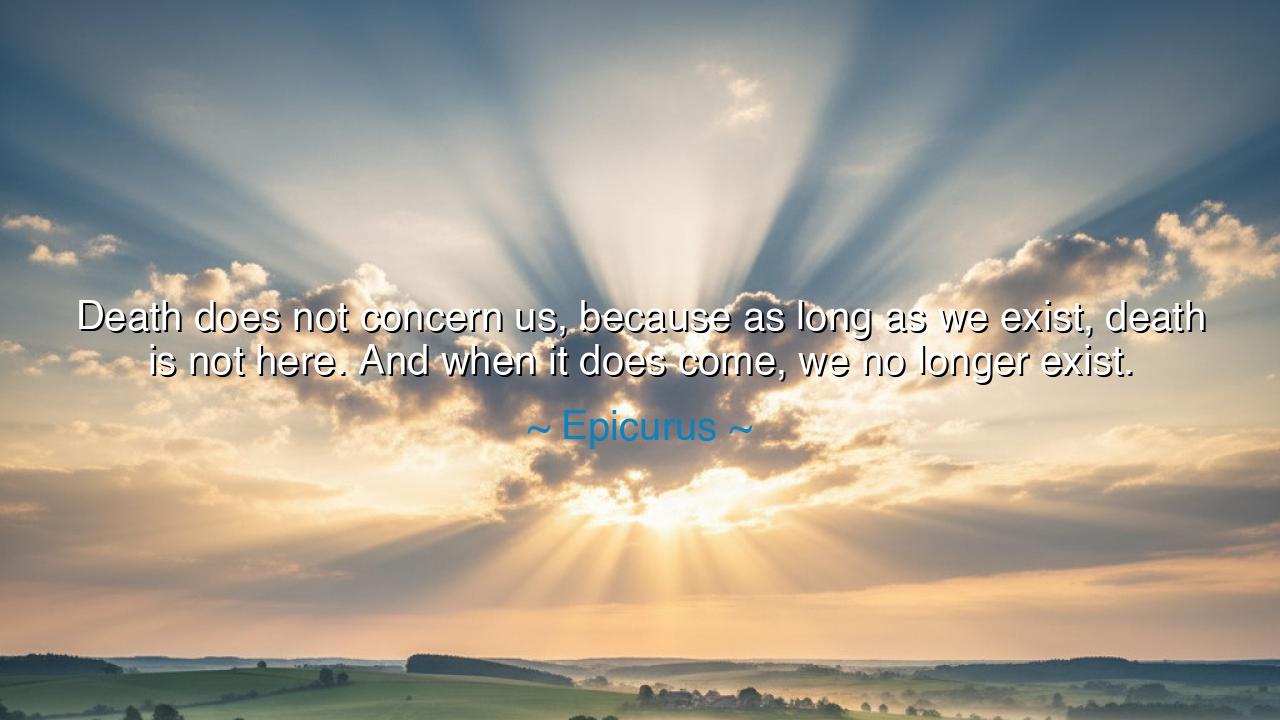
Death does not concern us, because as long as we exist, death is
Death does not concern us, because as long as we exist, death is not here. And when it does come, we no longer exist.






“Death does not concern us, because as long as we exist, death is not here. And when it does come, we no longer exist.” Thus taught Epicurus, the philosopher of peace and simplicity, whose words were written not to kings or scholars alone, but to all who tremble before the shadow of the inevitable. In this teaching lies one of the most profound consolations ever given to humankind — the liberation of the soul from the fear of death. For Epicurus, death is not an event to be dreaded, but a boundary that consciousness itself can never cross. Where life is, death is absent; where death is, life has departed. Therefore, there is no meeting between the two — and no reason for fear.
Epicurus lived in an age much like our own: filled with turmoil, ambition, and the endless chase after wealth and immortality. Yet he turned away from these illusions, retreating to his garden, where he taught that tranquility and happiness arise not from power or possessions, but from understanding the nature of things. Chief among the causes of human misery, he said, was the fear of death — that ancient terror that haunts every heart. Men exhaust their lives in trying to escape it, or distract themselves from it, never realizing that death is nothing more than non-being, and that what is nothing cannot harm us.
This teaching, though serene, is not cold. It does not deny the pain of parting or the sorrow of loss; it simply shows that fear itself is an illusion. When we imagine death, we imagine ourselves as witnesses to it — lying in darkness, feeling the end, suffering its stillness. But Epicurus reveals the fallacy: for to feel is to exist, and in death there is no feeling. To die is not to experience horror, but to cease experience altogether. Thus, death is not an event that touches us; it is merely the closing of the book. When we are here, it is not; when it is here, we are gone. Death and life never share the same hour.
Consider, for a moment, the example of Socrates, who centuries before Epicurus drank the hemlock with calm acceptance. Surrounded by his weeping disciples, he spoke gently of the soul’s release. “To fear death,” he said, “is to think oneself wise when one is not.” Socrates, like Epicurus after him, saw death not as a monster, but as the natural completion of life’s rhythm. He spent his final breaths in discussion, in teaching, in thought — proving that wisdom dispels terror, and that a mind at peace with life is at peace with death. He died as he lived: with reason and serenity.
Epicurus’s insight also teaches us something deeper — that to fear death is to forget how to live. For when one’s thoughts are consumed by what will come after, one cannot fully cherish what is now. Those who dwell constantly on death lose sight of the miracle of existence, and thus die many times before their final hour. Epicurus urges us instead to dwell in the present, to seek joy in simple things — friendship, understanding, gratitude — for these are within our control. Death is not; therefore, it is unworthy of our worry. Freedom begins when fear ends.
In every age, there have been those who have understood this truth and lived with courage because of it. The soldier who faces battle not for glory but for duty; the mother who endures pain for the sake of her child; the artist who creates though he knows time will erase his work — all of them have accepted that mortality gives meaning to life. Death does not diminish them; it exalts them, for in embracing their finiteness, they live more vividly, more courageously, more awake. As the Roman philosopher Seneca would later say, “He who has learned how to die has unlearned how to be a slave.”
So, my child, remember this: do not waste your days fearing the end. Fear steals life before death can. Death is not your enemy, nor your companion — it is simply the silence that follows the song. Live while you are alive; think clearly, love deeply, act nobly, and leave behind the fear that chains lesser souls. When your time comes, it will be as natural as the sunset — not a tragedy, but a transformation. For the wise man, as Epicurus teaches, death is not darkness, but rest — the return of the soul to the stillness from which it came.
Therefore, honor life by living it without dread. Let every morning remind you that you exist — and that in existing, you have nothing to fear. And when your final day arrives, greet it not as a thief, but as a friend who comes to release you from toil. For as long as you exist, death is not here; and when it comes, you will no longer be — and thus, you will have known the secret of peace.






AAdministratorAdministrator
Welcome, honored guests. Please leave a comment, we will respond soon